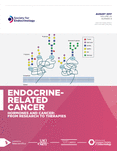Lessons learnt from outstanding mid-career women in endocrine cancer research
- Deborah J Marsh1⇑ and
- Charis Eng2,3,4
- 1Hormones and Cancer Group, Kolling Institute of Medical Research, Royal North Shore Hospital, University of Sydney, St Leonards, New South Wales, Australia
- 2Genomic Medicine Institute, Cleveland Clinic, Cleveland, Ohio, USA
- 3Deparment of Genetics and Genome Sciences, Case Western Reserve University School of Medicine, Cleveland, Ohio, USA
- 4Germline High Risk Focus Group, Comprehensive Cancer Center, Case Western Reserve University School of Medicine, Cleveland, Ohio, USA
- Correspondence should be addressed to D J Marsh; Email: deborah.marsh{at}sydney.edu.au
As cancer researchers, scientific data are by far the predominant language with which we tell our stories. We tell these stories in scientific publications, our conference presentations, to our trainees and to agencies and philanthropists supporting us to conduct fundamental basic and translational research. These stories are the path to achieving the ultimate goal of improving the lives of cancer patients. But to borrow from the American author Stephen King, ‘I think the best stories always end up being about the people.’ This thematic series highlighting mid-career women in endocrine cancer research presents some of these stories to acknowledge success, learn about new research fields and gain glimpses into the challenges, decision-making processes and roads travelled by these women on their path to achieving their professional goals.
To establish this series, endorsing societies of Endocrine-Related Cancer were contacted and the journal undertook a dedicated marketing campaign seeking nominations of outstanding mid-career women in endocrine cancer research. Nominees were assessed by a subset of editorial board members and the top six women from a competitive group were selected to be featured in this series, both through personal profiles and review articles of their current research areas. Review articles focus on a broad range of topics, including how molecular-based discoveries are beginning to drive new treatment strategies for neuroendocrine (NET) tumours (Pavel & Sers 2016); aspects of understanding prostate cancer, including the role of DNA methylation (Sweet & Ting 2016), the role of nuclear receptors (Leach et al. 2016) and circadian rhythmicity in the development and progression of this malignancy (Kiss & Ghosh 2016); as well as the role of extracellular matrix proteins in ovarian cancer metastasis (Ricciardelli et al. 2016) and thyroid-stimulating hormone in thyroid cancer (Nieto & …












